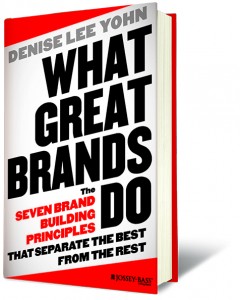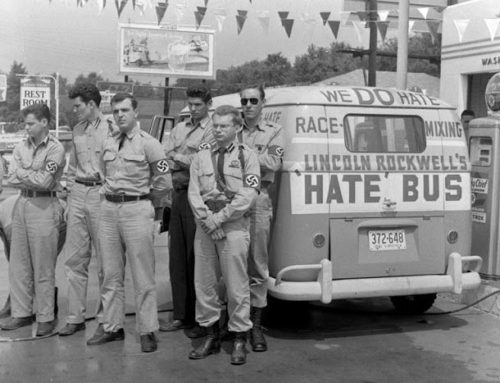
Think about the great companies you know, the great brands you’ve made part of your life, even part of your personality. Did any of them get there because they had great advertising? The answer is no. Great brands are built by great people who promise something relevant to customers and deliver on what they promise, year after year. If great advertising is part of that delivery, that’s wonderful. But companies that last are built from the ground up by the application of great principles in practice.
That’s what my friend Denise Lee Yohn’s What Great Brands Do, released this week from Jossey-Bass, is all about. It’s built on the idea that “branding” has nothing to do with marketing and everything to do with “operationalizing” the core purpose and brand promises of the company.
“Brand building is in no way confined to advertising and marketing,” Denise writes. “The proliferation of social networks and the pervasiveness of marketing in recent years may give the impression that companies should elevate the brand communications function, but growth in brand equity and influence comes from an entirely different way of thinking about and using brands.” She calls this new way of thinking “Brand as Business.”
Denise has worked as a brand builder for some of the world’s best companies and has observed well when her clients have done it right and when they missed the mark. She compiled that experience into Seven Brand-Building Principles that Separate the Best from the Rest.
1. Great Brands Start Inside
It always starts with the culture and the culture starts with people. And that means all the people. “Your brand has to be supported by everyone, from investors to suppliers and everyone has to be on board. … When you start brand building with brand communications, you’re simply expressing your brand. When you begin with reforming the company and recommitting your company culture, your brand produces a direct and lasting impact on all areas of your business.” That means you treat people coming in the back door—from job seekers to the cleaning crew just as you would treat the customers coming in the front door. It means that you’re promises are true at every touchpoint.
2. Great Brands Avoid Selling Products
When Nike says, “Just do it,” they’re not saying, “Just buy it.” They’re telling us each to go for our goals, to stopping making excuses, to get up off the couch and live up to our potential. Their selling us our own dreams. Nike looks back at the genesis of the “Just Do It” campaign as unlocking the genetic code of the company. “Digging deep for that genetic code has made all the difference for Nike,” Denise explains. “It has used its brand essence as a source of inspiration.”
3. Great Brands Ignore Trends
Every company that followed Apple into the smart phone business was following a trend that Apple established with the iPhone. But Apple wasn’t following a trend, it was starting one. Not that you can’t make money following a trend. But you can’t build a great brand that way. “Great brands ignore trends because they are unwilling to surrender their company culture and connections to the customers to the whims of the marketplace.” Great brands get out ahead of trends—or as we said in Nanovation, “at the intersection of trends”— and “create futures in which they (and their customers) thrive and grow.”
4. Great Brands Don’t Chase Customers
Denise offers the example of the Rolling Stones, who’ve outlasted every other rock band in history. When they started, they alienated large parts of their audience by flirting with the girls in front of their boyfriends. The girls loved it and their message was clear: we don’t care what you think. We are who we are. It was exactly the right message for the times but more than that, it was the right message for the millions of people who became Stones fans. “Brand managers who chase customers may believe they’re doing the smart thing, seeking to maximize the breadth of customer appeal. But chasing customers can drive down profits, blur your brand message and put your truly loyal customers at the end of the line behind people who will never be your fans.” By focusing on your user base and being true to them, you build a stronger brand.

5. Great Brands Sweat the Small Stuff
Great brands focus on the details of brand touchpoints. Denise shows how Singapore Airlines has consistently been the world’s top rated airline by making the small stuff their business. “Singapore Airlines is a great example of how a company operationalizes its brand values so thoroughly that the ethos of ‘sweating the small stuff’ suffuses the company’s business processes, the epitome of brand-as-business philosophy.” She points out that the passenger’s experience is far more finely furnished that that of the company brass, whose offices are modest and functional. As a result of their detailed customer focus, no other airline has been able to match Singapore’s consistency in delivering on their brand promises.
6. Great Brands Commit and Stay Committed
It takes guts to sacrifice the sacred—like short-term profits or stock price growth—in order to maintain your brand integrity. But if you’re really committed to your brand promises, you’ll know when to make that call. “By its very nature, commitment to a brand platform requires a brand that continues to deliver value over the long term. Brands therefore must be sustainable and integral—sustainable in the sense that their relevance is evergreen, and integral in the sense that they create value for everyone involved.” That doesn’t mean that you keep making typewriters as the rest of the world turns to word processors. It means you’re so connected to the needs of your users that you’re the one who creates the next new technology.
7. Great Brands Never Have to “Give Back”
In Nanovation, we hit on this when we talked about companies that build corporate social responsibility (CSR) into the fabric of their business strategy, rather than as a year-end check to a charity. Great companies do well by doing good, by adding value to society. “Consumers are tired of companies who take with one hand and “give back” with the other. Great brands use the power of their brands to inspire change.” Consumers are very careful with their brand loyalty. And if you want to earn it, you’ll have to be about more than your financial results. You’ll need to stand for making a positive difference in the world.
Those of you who have been following as I’ve been blogging the early chapters of my upcoming book Branded to the Bone will understand why I like Denise’s book so much. She really gets it and she’s one of the few today who understand that brands are built from the ground up by integrity of purpose, integrity of people and integrity of action. The book is filled with lots of stories and concrete examples. Get it on your Kindle or iPad and start building a great brand.
(Photo: Petty Officer 2nd class Dawn Leclair performs maintenance on a General Electric F110-GE-400 jet engine in the Jet Shop aboard the aircraft carrier USS Harry S. Truman (CVN 75) underway in the Persian Gulf on Nov. 29, 2004. Leclair is a Navy aviation machinist’s mate. DoD photo by Airman Kathaleen A. Knowles, U.S. Navy.)


